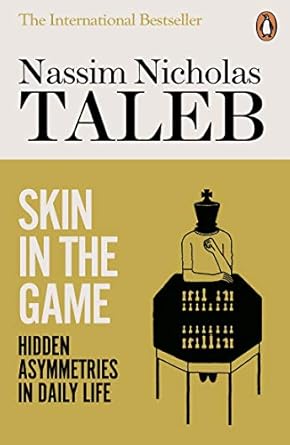Skin in the Game
Hidden Asymmetries in Daily Life
Nassim Nicholas Taleb

Dense but brilliant - Taleb's most important work on risk, accountability, and human nature
The Core Principle:
"Skin in the game" isn't just about having incentives - it's about symmetry. It's not enough to share in the benefits; you must also share in the harm and pay penalties when things go wrong. This simple principle explains much of what's broken in our modern world.
The Bob Rubin Trade - A 3,800-Year-Old Scam:
Taleb introduces us to the "Bob Rubin trade" - named after the former Treasury Secretary who collected $120 million from Citibank in the decade before 2008, then walked away when taxpayers had to bail out the bank. It's the ancient game of "heads I win, tails you lose." Remarkably, Hammurabi's Code from 3,800 years ago was designed specifically to prevent this: "If a builder builds a house and the house collapses and causes the death of the owner - the builder shall be put to death." The punishment creates perfect symmetry.
Systems Learn Through Elimination, Not Education:
The knowledge we get through trial and error, tinkering, and direct contact with reality is vastly superior to abstract reasoning. Many bad pilots are at the bottom of the Atlantic - transportation got safer not because people learned from errors, but because the system filtered out the dangerous ones. This is why skin in the game keeps human hubris in check and why "first do no harm" matters so much.
The Curse of Complexity:
People without skin in the game create unnecessary complexity. When you're rewarded for perception rather than results, you need to show sophistication. Things designed by people without skin in the game tend to grow in complication before their final collapse. Practitioners, who face real consequences, instinctively seek the simplest solutions that work.
Scale Matters - Local vs Global Ethics:
Ethics fundamentally work at local scales. Elinor Ostrom found that below certain community sizes, people naturally act as collectivists protecting common resources. But this breaks down at larger scales. As the Graham brothers put it: "I am, at the Fed level, libertarian; at the state level, Republican; at the local level, Democrat; and at the family and friends level, a socialist."
The Minority Rule:
An intransigent minority with skin in the game - as small as 3-4% of the population - can force their preferences on the entire majority. This creates an optical illusion where naive observers think they're seeing majority preferences when they're actually seeing minority rule in action.
Dynamic Equality and Ergodicity:
True equality isn't about raising the bottom - it's about making the rich face the risk of losing their position. Dynamic equality means that someone who is rich should never be certain to stay rich. Perfect ergodicity would mean each person, living forever, would spend proportional time in each economic class. The opposite - absorbing barriers - creates permanent class divisions and justified resentment.
True Virtue vs Virtue Signaling:
Real virtue happens in private. As the biblical passage warns: "Do not practice your righteousness in front of others to be seen by them." True virtue lies in being nice to those neglected by others - the less obvious cases that grand charity businesses miss. Charlie Munger's question captures this perfectly: "Would you rather be the world's greatest lover but have everyone think you're the world's worst, or be the world's worst but have everyone think you're the greatest?"
The Artisan's Soul:
Artisans have their soul in the game. They do things for existential reasons first, financial ones second. They combine art and business, put pride in their work, and have sacred taboos - things they won't do even for profit. This stands in stark contrast to modern professionals who optimize everything for efficiency and eventually come to dislike their work.
The Ultimate Lesson - Courage and Entrepreneurship:
"Courage (risk taking) is the highest virtue. We need entrepreneurs." For young people wanting to help mankind, Taleb's advice is simple: Never engage in virtue signaling, never engage in rent-seeking, and start a business. Put yourself on the line, take bounded risks, and if you get rich, spend generously on others.
Why This Book Matters:
In a world increasingly dominated by people who are "better at explaining than understanding, or better at explaining than doing," Taleb provides a crucial filter for distinguishing between real wisdom and academic theorizing. The principle of skin in the game cuts through complexity and reveals the hidden asymmetries that plague modern institutions.
The book is demanding - Taleb doesn't simplify his ideas for mass consumption. But the insights are profound and immediately applicable to evaluating everything from financial advice to political policies to personal relationships. Once you understand skin in the game, you see its absence everywhere.
Click here to see it on Amazon
Ease to Read
3/5
Insights
5/5
My Love-Indicator
4/5
<Back